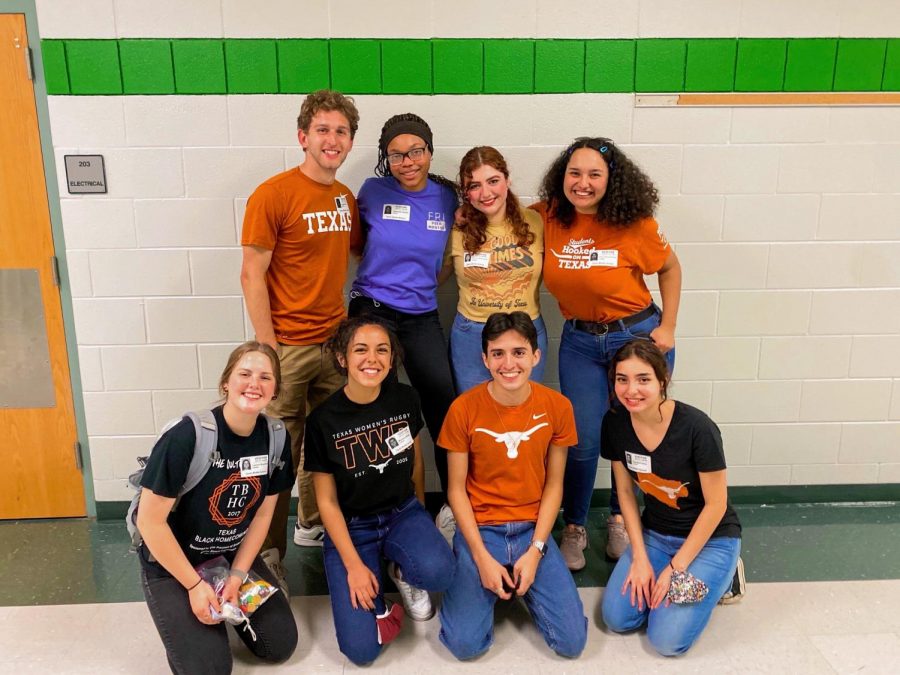Some UT students who translate for their parents say pandemic increased stress
November 18, 2021
After immigrating to the U.S. during high school, Vanessa Crespo realized her previous English classes did not fully prepare her to translate everyday tasks for her Spanish-speaking parents, such as shopping, appointments and meetings.
Crespo, a government and philosophy senior, also translated studies, explained mask regulations and researched vaccination sites for her parents when the COVID-19 pandemic hit.
“It was frustrating in the sense that they were (able to get) vaccinated, but when and where and what vaccine are they getting?” Crespo said. “Those kinds of things are frustrating, but I make sure to keep in contact with them just to keep myself updated and to feel more calm.”
Now, Crespo is a research assistant at Project SEED, a UT project that studies the social and emotional effects on adolescents who translate for their parents, according to the program’s website.
Adolescent translators may have also experienced increased stress during the pandemic from translating difficult topics, said Yang Hou, an assistant family sciences professor at the University of Kentucky.
“COVID-19 amplifies many preexisting discriminations, especially against Asian Americans and many other immigrant families, and it’s also raised many medical concerns,” Hou said. “So, I think this would lead to more negative experiences … because due to (the adolescents’) role as a (translator), they would be exposed to more of these negative discussions on stressful things in life.”
Previously, research assistants went to participants’ homes and simulated a stressful translating experience and recorded what the adolescent translators got correct or incorrect over several years.
The researchers switched to virtual communication because of the pandemic and sent daily surveys to participants to gauge their social and emotional health. Now, some aspects of research have returned in-person, such as taking hair or saliva samples from participants to observe stress levels.
“(The participants) can say ‘Oh I’m fine, I don’t feel stressed when I’m doing this,’ but then their enzyme levels can say something totally different,” said Isabel Weatherley, a student research assistant for Project SEED, human development and family sciences junior.
Peeyal Kumar, a Project SEED research assistant, said after moving back in with her parents during the early stages of the pandemic in March 2020, she found it stressful to translate all of the COVID-19 news.
“A lot of it was articles with a lot of medical information and new scientific breakthroughs,” sociology senior Kumar said. “I feel like with a lot of other things, I can at least explain what it is without saying the word, but it’s hard with medical and science terminology.”
The Ojeda Program, an offshoot of Project SEED that focuses on creating a safe space primarily for students translating for parents, also went back in-person this semester. Maleni Arredondo, a coordinator for the Ojeda Program, said the meetings create a space where middle schoolers can practice their bilingual skills through games and other fun activities.
“What we’re really trying to do is we’re trying to be that stable community that they have, that backbone that allows them to see that kids like them, because we are kids like them, can make it,” public health junior Arredondo said. “(We want them to know) you can aspire to do better because in the end, that’s what our families came here for.”
Hou said the Ojeda program and others like it are important to help ease the burden on adolescent translators.
“We’re hoping this kind of intervention program can improve language brokers’ skills and help their understanding,” Hou said. “And (learning) how to handle the things that happen during the process will help them to feel better about (translating) and benefit more from the experience.”
Hou said translating is not always a positive or negative experience for adolescents. Project SEED analyzes multiple effects translating can have on participants, such as stress, academic performance, social outcomes and parent-child relationships.
Crespo said despite the occasional frustration of forgetting words in Spanish, she likes the feeling of helping her family and said she believes it brought them closer together.
“I had to connect myself more to them; I had to become more empathetic to them,” Crespo said. “I would say in a way, it actually made my relationship (with my parents) better than before.”



